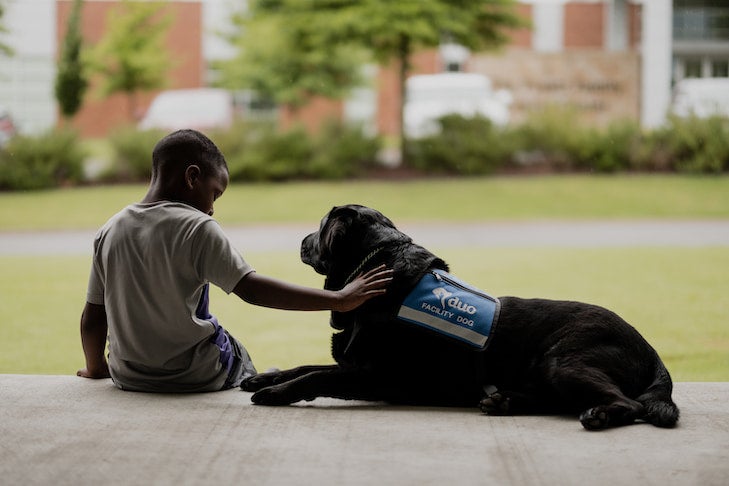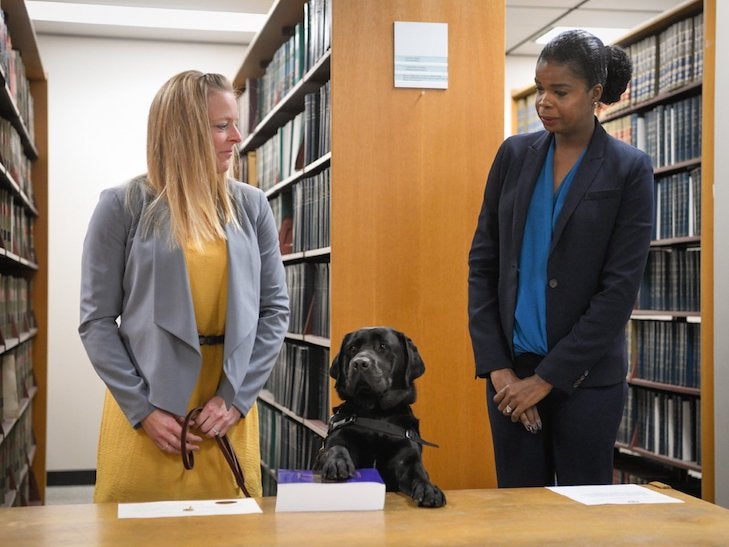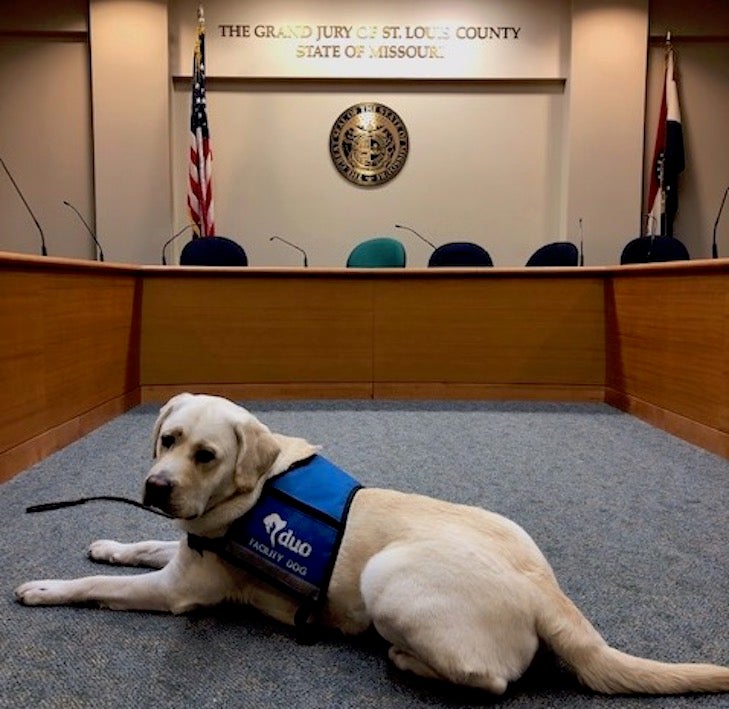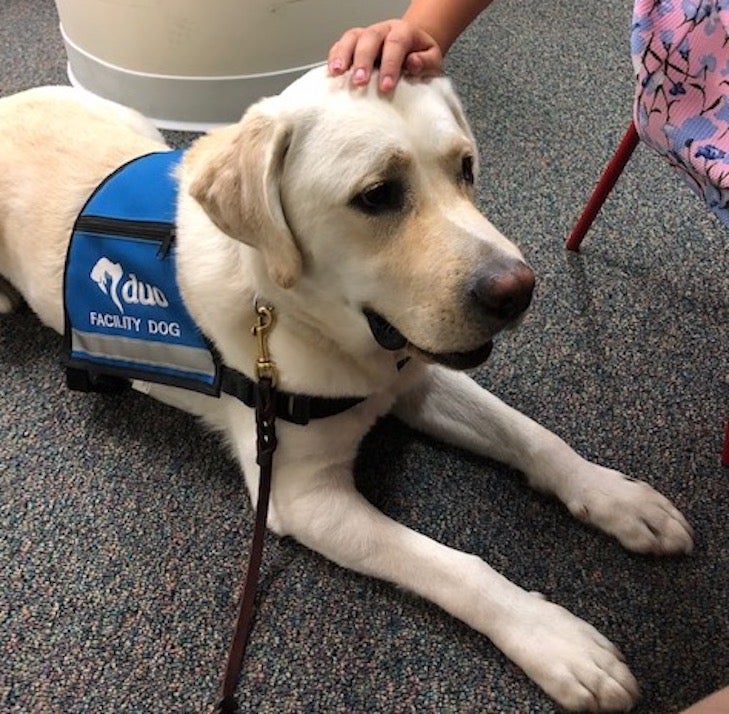
In November, a 2-year-old black Labrador Retriever named Hatty made headlines as the first facility dog to be employed by the Cook County State Attorney’s Office in Illinois. Specifically, Hatty has been tasked with providing courtroom comfort to child victims of violence and sexual assault. Trained and provided by the St. Louis-based organization Duo Dogs, the compassionate canine is intended to help alleviate the anxiety that accompanies coming to court, especially in cases involving children.
Hatty’s story became national news, in part due to her sweet swearing-in photo with a paw atop a law book. However, Duo has been successfully training and providing facility dogs across the country for over 10 years. As of 2020, Duo can now count 36 facility dog success stories among 116 active dog/handler teams. Before placing their first facility dog in 2009, Duo Dogs (formerly known as Support Dogs, Inc.) had been training service dogs for individuals since 1981.
Unlike other organizations, Duo is unique in that they simultaneously train mobility and hearing assistance service dogs for individuals alongside facility dogs for courtrooms, schools, child advocacy centers, and elsewhere. On top of that, Duo has certified over 250 therapy dog teams through its TOUCH (Therapy Of Unique Canine Helpers) and Paws For Reading programs.
“We do what we can do best,” says Duo Dogs Executive Director Peggy Musen. “There are so many uses for these dogs. A dog can break down a barrier for a child, or an adult, and be a therapeutic tool that is so beneficial for them to start healing. It’s no technology, and it’s nothing fancy. It’s just the simpleness of a dog and a person, and making that connection.”

Temperament & Training: A Dynamic Duo
Humans have long understood the need for service dogs for individuals with disabilities or impairments. Literature describing guide dogs was found as early as 1816. Duo Dogs was first founded by a woman in need of a service dog in 1981. Over time, the organization slowly expanded from a 6,000-square-foot office space to a 25,000-square-foot dedicated facility. They introduced their own breeding program of Labrador Retrievers and Golden Retrievers, to better manage the quality of their dogs.
Plenty of factors contribute to Duo’s ongoing success, but they maintain part of the “secret sauce” is the dedicated on-site puppy personnel known as “Whelper Helpers.” These volunteers spend 24 hours a day with newborn pups for the first eight weeks of life, socializing them and getting them used to being around people all day, every day. Duo even hosts two online “Puppy Cam” streams for those wanting to sneak a peek at the next generation of stellar service and facility dogs.
“The temperament of our dogs is what makes them different,” says Musen. “They’re loved from the minute they’re born. That’s very important to us. These dogs didn’t ask to do this. They were born into this, and so we want to make sure they’re being well-cared for.”
After eight weeks, the Duo dogs are then transferred to “Puppy Raisers,” who become responsible for the pups until they are 18 months old. During this time, puppies are given exposure to the world and basic obedience training to prepare them for pairing with an individual or facility. Some dogs even “go to jail” periodically, to spend time being raised by vetted inmates in local prisons.
Once 18 months old, the dogs are returned to Duo, where they begin to undergo advanced training. Duo dogs are then taught around 50 skills and commands to prepare for a potential service dog pairing. Individuals paired with an assistance dog are then required to attend two weeks of dedicated training at Duo. Facility dogs, destined for a different line of work, require two handlers from each facility to both attend one week of training.

Facility Dogs’ Increasing Importance
All told, Duo spends about $39,000 to breed, raise, and train each assistance or facility dog. However, the organization never charges clients for Duo dogs, aside from a small equipment fee. Duo currently boasts an 85% success rate among dogs they’ve raised, but don’t stress over that other 15%. They simply undergo a “career change” and settle into lives as normal family pets, where an always-lengthy waitlist ensures that all end up in good homes.
Throughout their adolescence, Duo trains all of their dogs to succeed in service work. Although, some of them end up as facility dogs instead. Often, the personality of the pup will help dictate where they ultimately end up.
“All our dogs are trained the same way,” says Musen. “The facility dog doesn’t usually use most of those skills because they have a different job. Their job is just to be petted and loved and give that child a sense of security and non-judgment when they have to tell a story of abuse that they’ve encountered. Same dogs, same training, but two different really outcomes of those two dogs.”
“Just being petted” sounds like a dream job for a charismatic canine. But Duo dogs do so much more than that. Increasingly, Duo’s facility dogs are deployed to courtrooms and child advocacy centers to comfort especially vulnerable victims of physical or sexual abuse. Often, these children are asked to testify in courtrooms while their abusers sit mere feet away. This can be a traumatic and fearful experience for victims, but Duo dogs have proven invaluable to the healing process.
“It’s been almost miraculous,” says Lisa Jones, Program Manager for the Victim Unit in the St. Louis County Prosecuting Attorney’s Office, and handler of Duo dog Levi the yellow Lab. “Levi brings a level of comfort to these individuals that would have taken us weeks or months to achieve. He’s so intuitive that it just immediately breaks down barriers that are there for victims, and they feel safe talking.”
Duo Dogs Success Stories
Jones was admittedly skeptical upon being contacted by Duo in 2018. She was aware of facility dogs being deployed in nearby counties but was uncertain about their efficacy. Once Levi arrived, however, her stance on facility dogs was immediately upended. In fact, it took only three weeks of work for Levi to move his new co-workers to tears of joy.
An 8-year-old girl with autism had been refusing to speak to Jones and her team for months about her abuse. One day, just weeks after Levi’s arrival, Jones bought the lovable Lab in to see how the girl would react. Almost immediately, a connection was made, and in moments, the child was whispering her secrets into Levi’s floppy ear. As a result, the case was finally allowed to proceed with the help of the young girl’s testimony.

“Anything that we can do in the criminal justice system to alleviate the stress of a victim is worth trying,” says Jones. “All of us had tears in our eyes because we had never seen this little girl open up. It was amazing. It was all Levi.”
Besides Hatty and Levi in their courtroom comfort roles, Duo Dogs success stories can be found all across the country, and perhaps soon, the rest of the world. Indeed, Levi’s littermate Oliver was recently deployed to Kent, England, as Duo’s first facility dog sent overseas. His handlers hope to gain insight into the impact of Duo’s facility dogs, and eventually, bring more across the Atlantic.
Though not yet past his puppy raising period, Duo dog Barclay made national news this year as the unofficial mascot of the St. Louis Blues hockey team, based in Duo’s backyard. The lively Lab will likely end up as a facility dog after he returns to Duo at 18 months old. But the pup has become a star in the interim. The franchise won its first-ever Stanley Cup trophy in 2019 following Barclay’s arrival. In a December special filmed at the AKC Museum of the Dog, the “Stanley Pup” was named one of CW’s 2019 Dogs of the Year.
Among the more unique success stories is the stray cat dubbed D-O-G, who was brought in off the street to live at Duo in 2017. The friendly feline aids in acclimating new Duo puppies to the world, and was even awarded the ASPCA’s “Cat of the Year” for his merits in 2018.
An Incalculable Impact
Musen affirms that there are nearly too many Duo Dogs success stories to keep track of. One standout, though, is Jake, a black Lab facility dog deployed to Arkansas. Jake works with over 400 children a year at the Child Safety Center of White County. His job is to provide comfort and a sense of security to child abuse victims during forensic exams and interviews.
“Jake has made more of an impact than I could have ever dreamed,” says Child Safety Center Executive Director Robin Connell. “He lowers anxiety, stress responses, and blood pressure. He allows children to speak about the unspeakable while he lays his big head in their lap to be stroked.”

After two years, Connell is certain that Jake has been the greatest addition she possibly could’ve made to her child advocacy center. Beyond the obvious impact he has on helping children heal and recover from trauma, Jake provides the Child Safety Center staff with comfort, compassion, and “a warm, safe place to land on exceptionally hard days.” In the field of child advocacy, the needs of the children naturally come first. It can be easy for some to overlook the stresses endured by adults handling these cases. Not for Jake, though. The remarkably intuitive animal seems to have a sense for when he’s needed most, and always rises to the occasion.
As the incredible healing powers of dogs continue to be illuminated, Duo expects their dogs to become more in-demand. For individuals and facilities fortunate enough to receive a Duo dog, however, there is nothing but reverence and appreciation for the outstanding organization that raises, trains, and provides these exceptional creatures to those needing them most.
“Duo Dogs will never truly understand what an impact they are making,” says Connell. “They’re using their skills and resources to train these magnificent animals who go into the world to literally change lives. Our gratitude is impossible to put into words.”

